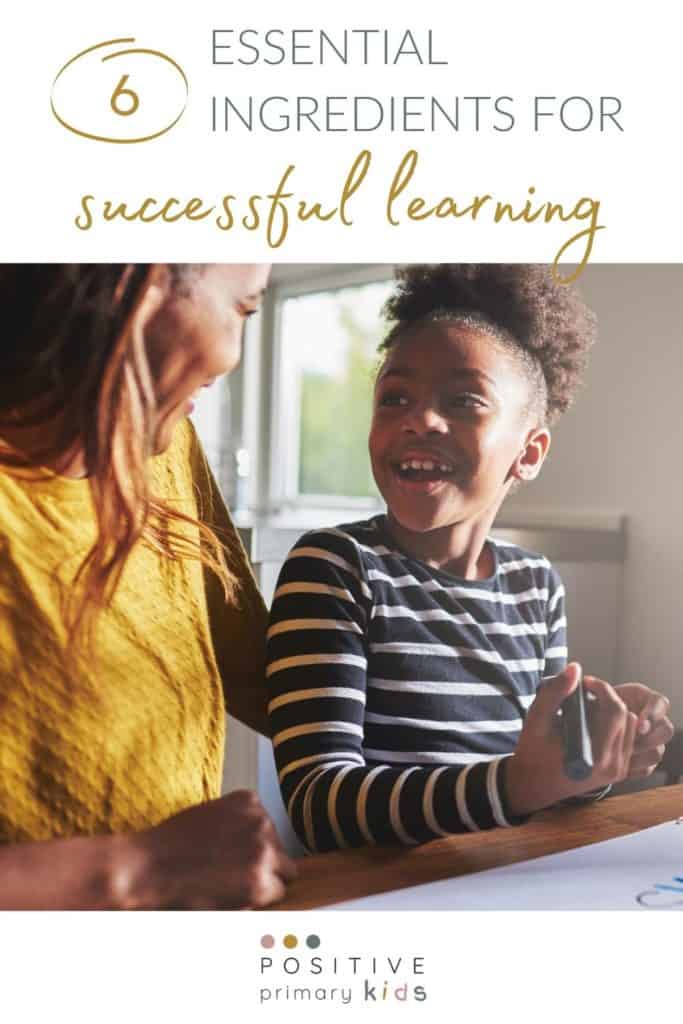6 Essential Ingredients For Successful Learning in Primary School
Learning effectively can be challenging. Even the smallest things can have a large impact on how well – or not – you are able to learn.
In this short post, I take a look at the absolutely essential needs that children need to have met before they can be expected to be willing and able to learn at all.
Let’s Start with The Basics for Successful Learning in Primary School
When we learn, our brains need to be free from things that stop us from being able to pay attention. Sometimes, these things are out of our control. Right now, for example, the road outside my house is being dug up with pneumatic drills, making it very hard for me to get my thoughts straight! My brain just isn’t fully available for the task I am trying to achieve.
There are always going to be distractions and things that you can’t control when it comes to how your child learns, especially at school. From noisy classmates or worrying about friendships to a bee flying into the classroom and causing chaos, many situations are out of your hands.
Rather than worrying about the things you can’t control, let’s take a look at what you can. Read on to see how meeting basic needs can influence successful learning.



6 Ingredients for Successful Learning in Primary School
As a parents, you know the importance of meeting your child’s basic needs. Let’s take a look at how satisfying these needs frees up the brain for learning success.
1. Quality sleep and rest
As well as replenishing energy, getting enough quality, undisturbed sleep allows our brains to sort, store and remember what we experience and learn during the day. Insufficient sleep and rest lead to difficulty concentrating and remembering, low energy and grumpiness with other people.
Is your child getting enough sleep?
32% of primary school pupils don’t get the minimum recommended amount of sleep. Learn about the 10 top benefits of children getting quality, restorative sleep. Looking for ways to improve sleep quality? Here’s over 20 sleep hygiene tips to help you.
2. Keeping hydrated
Staying hydrated (rather than waiting until we are thirsty) helps us to remain focused. Even mild hydration can cause brain cells to lose efficiency, headaches and irritability. Drinking water throughout the day is revitalising and can improve memory, attention span and mood.
Getting your child to drink enough water can be a challenge, but it’s crucial for health and learning
How much water does your child drink each day? The recommended amount is 1280ml per day for children aged 4-8 and between 1520ml and 1680ml for 9-13-year-olds. Find out about 8 essential benefits of hydration for wellbeing and brain function.
3. Regular nutritious meals
We all know that nourishment is important for healthy development, but good nutrition also influences learning. A balanced diet of regular meals containing a wide range of fresh fruit, vegetables and unprocessed foods provides energy and also boosts brain function and structure. A nutritious breakfast is particularly important. Diets that are high in saturated fats have been shown to cause energy slumps and impair learning and memory.
4. Be an accepting, listening ear
Building non-negotiable time into your day to listen to your child provides a sense of importance, safety and stability. They can share any worries they have with you so that they can be dealt with before they become problems. Routines like this provide a predictable structure that helps kids to feel secure.
5. Supporting and celebrating
Showing a genuine interest in what your child has been doing asking lots of questions helps them to process events of the day and retain what they have learned. Recognising efforts that they have made and their achievements will motivate them to continue learning.
6. Comfortable, suitable clothes
This one might seem a bit odd. But think about a time when your shoes were rubbing, a clothes label was scratching at your neck or you regretted choosing the outfit that you put on that morning in your warm house now that you are in a drafty office. When your clothing is uncomfortable or making you too warm or cold it has a huge impact on your ability to focus. Clean, comfortable clothing that fits and is suitable for the environmental temperature is a good choice.
A Note About Maslow’s Hierarchy of Needs
Many of the ‘ingredients’ to successful learning in primary school that I’ve listed here are similar to those in Maslow’s Hierarchy of Needs. If you do any research on supporting successful learning in primary school you are likely to come across Maslow’s theory. It’s a popular theory about human motivation that is widely used in education.
I haven’t referred to this theory specifically within this post because although it is still widely accepted and useful in many ways, there are a number of scientific and ethical flaws. For example, it doesn’t account for individuals learning in different ways or cultural differences. It also places the need to feel loved and have a sense of belonging halfway up the hierarchy – could you learn well if you didn’t feel loved or were neglected? Additionally, it is problematic due to dubious research methods and whitewashing claims that Maslow “borrowed” these ideas from the Blackfeet Nation’s teachings without acknowledging them.
Do you have any tips for setting kids up for successful learning in primary school?
Did you find the tips listed in this article helpful? What are some of your tips for making sure kids are able to focus on their learning? Let me know in the comments below!
Recommended Reading On This Topic:
- Staying Hydrated in the Classroom – Why is it so important? – Pure Water People
- What is the Relationship Between Child Nutrition and School Outcomes? – Centre for Research on the Wider Benefits of Learning






